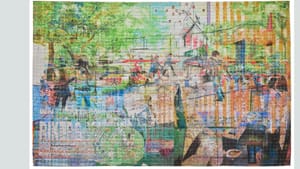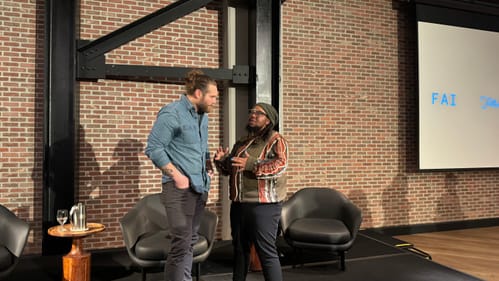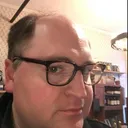Stay in the Loop
BSR publishes on a weekly schedule, with an email newsletter every Wednesday and Thursday morning. There’s no paywall, and subscribing is always free.
Catching up with Jesse Krimes
The Philadelphia Museum of Art presents Rikers Quilt

Director Alysa Nahmias’s 2021 documentary Art & Krimes by Krimes—which showed that fall at the Philadelphia Film Festival under its earlier title Krimes—is an acclaimed film about the Pennsylvania-born artist Jesse Krimes. Sentenced to several years in prison for a drug conviction in 2009, Krimes made art while incarcerated, and the film depicts his re-entry into society after his release, as well as his work with currently incarcerated folks.
Krimes continues to focus his artwork on incarceration and its effects. And, in a good thing for any artist, he’s been very busy of late with his artwork and activism.
In late April, I spoke with Krimes for BSR about the documentary's legacy and his continuing, intertwining work in art and activism.
After Apokaluptein
Krimes, who lived in Philadelphia for years but recently moved to Bucks County, created Apokaluptein16389067:II while incarcerated, a multi-panel work that used prison bedsheets and other available supplies.
“I had very recently come home from prison, and I was able to set my big work up, the Apokaluptein bed sheet piece, up in a studio a block away from Eastern State Penitentiary,” Krimes told me. He was asked to do a talk at the penitentiary, where Pete Brook, the author of a blog about prison photography, wrote about Krimes’s work. Nahmias read the article and was inspired to reach out and ultimately make the film. She began filming him a few months after his release, and the film was in the works for more than seven years.
“It had a profound effect,” Krimes said of the experience of the documentary. “The short answer is that it was a struggle, kind of building my career, breaking into the art world, and building the Right of Return Fellowship and the Center for Art and Advocacy, which it’s kind of grown into.”
The film’s finish and release “exponentially amplified the work,” he continued, and not only his art as an individual but the work of “really advocating and supporting other former[ly] incarcerated artists.” He toured with the documentary to different city film festivals, engaging with communities across the country and internationally. “So it really helped connect me, through that process, to a broad community of support who was interested not only in me as an artist but also in the larger work that I try to do through my artwork.”
Art & Krimes by Krimes won an Emmy Award in 2023 at the Annual News & Documentary Emmy Awards for Outstanding Arts and Culture Documentary. It is available to stream on Paramount+ and to rent from all major video-on-demand channels.
Rikers Quilt at the PMA
In March, the Philadelphia Museum of Art began showing Krimes’s Rikers Quilt in its Williams Forum, where it will remain through July 15, 2024. The piece was created in 2020, during the pandemic, when the mayor of New York announced plans to close Riker’s Island and spend billions of dollars on four new jails throughout the city.
“There were a lot of protests going on around that, and I built this massive monumental quilt, which is about 25 feet tall and 35 feet long,” Krimes explained, noting that the quilt comprises 3,650 individual squares—"one for each day that Riker’s remains open over a 10-year timeline.” He said the work was originally intended to be used “as a protest piece” by the movement to end Riker’s sooner, designed for interaction and display outdoors “as a way to galvanize attention.”
The PMA show is the quilt’s first institutional exhibition and the first standalone showing of Krimes’s work at the museum, although his work has been there before, including as part of 2021’s New Grit: Art & Philly Now exhibition.
“It sounds like people are really engaging with the work, one because it’s massive, so it takes up this enormous space,” Krimes said. “I designed it so aesthetically, from a distance, it’s very colorful and kind of visually appealing. It has a mixture of exterior views of Riker’s Island, the sign, aerial, and interior views. It really is semi-representational yet abstract work that’s really inviting, so it gets people’s attention. But then upon closer inspection, you see these idealized renderings of the new jails, these slashes in the surface that reveal hidden wounds, so I think it’s generating a lot of conversation on the usefulness of jails, and if they’re providing or they’re perpetrating harm.”
The work of abolition continues
Krimes founded the Center for Art and Advocacy, which is meant to “serve as a direct path to sustainability and equity for artists directly impacted by the criminal legal system.” It grew out of the Right of Return Fellowship, and the center has a lot of big plans, including an academy program, and a new 2,600-square-foot gallery space in Brooklyn.

He has also worked with Philadelphia’s storied Mural Arts program. Working with them was his first job after prison, and he appreciates them for being “the very first people who supported me in my work.” He has also worked on other projects with them in the years since and hopes to do more with them.
Back in January, Krimes appeared on a panel at the Fitler Club, which included showings of scenes from the documentary.
Regarding his views on incarceration, Krimes referred to himself as an “abolitionist” while acknowledging that’s there a lot of misunderstanding out there about what that really means. “The media has been very good at demonizing the use of that term,” he said, referring to a mistaken belief that “you just want to do away with all the prisons, and then everyone’s on the streets. That’s not what it means at all.”
“But I am an abolitionist because I do believe that the current system in the States is in no way designed to keep anyone safe or actually better society,” he insists. “So I think we need to completely reimagine the current system and replace it with something that is actually geared toward creating a positive benefit to society. … We know that punitive structures don’t work.”
What, When, Where
Jesse Krimes: Rikers Quilt. Through July 15, 2024, at the Philadelphia Museum of Art, 2600 Benjamin Franklin Parkway, Philadelphia. (215) 763-8100 or philamuseum.org.
Accessibility
For accessibility information, visit the museum's website.
Sign up for our newsletter
All of the week's new articles, all in one place. Sign up for the free weekly BSR newsletters, and don't miss a conversation.
 Stephen Silver
Stephen Silver